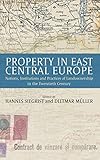Property in East Central Europe : Notions, Institutions, and Practices of Landownership in the Twentieth Century / ed. by Dietmar Müller, Hannes Siegrist.
Material type: TextPublisher: New York ; Oxford : Berghahn Books, [2014]Copyright date: ©2014Description: 1 online resource (344 p.)Content type:
TextPublisher: New York ; Oxford : Berghahn Books, [2014]Copyright date: ©2014Description: 1 online resource (344 p.)Content type: - 9781782384618
- 9781782384625
- Land tenure -- Europe, Eastern -- History -- 20th century
- Land tenure -- Poland -- History -- 20th century
- Land tenure -- Romania -- History -- 20th century
- Land tenure -- Yugoslavia -- History -- 20th century
- Post-communism -- Europe, Eastern -- History -- 20th century
- Real property -- Europe, Eastern -- History -- 20th century
- Right of property -- Europe, Eastern -- History -- 20th century
- HISTORY / Modern / 20th Century
- History: 20th Century to Present
- 333.309437/0904 23
- HD590.7 .P767 2015eb
- online - DeGruyter
| Item type | Current library | Call number | URL | Status | Notes | Barcode | |
|---|---|---|---|---|---|---|---|
 eBook
eBook
|
Biblioteca "Angelicum" Pont. Univ. S.Tommaso d'Aquino Nuvola online | online - DeGruyter (Browse shelf(Opens below)) | Online access | Not for loan (Accesso limitato) | Accesso per gli utenti autorizzati / Access for authorized users | (dgr)9781782384625 |
Frontmatter -- Contents -- Tables -- Acknowledgements -- Introduction Property in East Central Europe Notions, Institutions and Practices of Landownership in the Twentieth Century -- PART I ECONOMIC HISTORY -- 1 The Changing Landscape of Property Landownership and Modernization in Poland in the Nineteenth and Twentieth Centuries -- 2 Agriculture and Landownership in the Economic History of Twentieth-Century Romania -- PART II PROPERTY BETWEEN LAW AND POLITICS -- 3 Property in East Central European Legal Culture -- 4 The Habsburg Cadastral Registration System in the Context of Modernization -- 5 Property between Delimitation and Nationalization The Notion, Institutions and Practices of Land Proprietorship in Romania, Yugoslavia and Poland, 1918–1948 -- 6 Front-line Soldiers into Farmers Military Colonization in Poland after the First and Second World Wars -- 7 The Country Road to Revolution Transforming Individual Peasant Property into Socialist Property in Yugoslavia, 1945–1953 -- PART III PRACTICES AND MENTALITIES OF LANDOWNERSHIP -- 8 Homeland as Property Symbolic Ownership and the Local Heritage of the Past in Lemkowyna and the Ukraine -- 9 Landownership in Practice The Case of Naramice in Central Poland -- 10 Property and Agricultural Policy in T wentieth-Century Romania Intentions, Technical Means and Social Realities -- 11 Contemporary Notions and Practices of L andownership in Central Serbia The Case of Mrčajevci -- 12 The Practices of Landownership in Vojvodina The Case of Aradac -- Select Bibliography -- Notes on Contributors -- Index
restricted access online access with authorization star
http://purl.org/coar/access_right/c_16ec
Property is a complex phenomenon comprising cultural, social, and legal rules. During the twentieth century, property rights in land suffered massive interference in Central and Eastern Europe. The promise of universal and formally equal rights of land ownership, ensuring predictability of social processes and individual autonomy, was largely not fulfilled. The national appropriation of property in the interwar period and the communist era represent an onerous legacy for the postcommunist (re)construction of a liberal-individualist property regime. However, as the scholars in this collection show, after the demise of communism in Eastern Europe property is again a major factor in shaping individual identity and in providing the political order and culture with a foundational institution. This volume analyzes both historical and contemporary forms of land ownership in Poland, Romania, and Yugoslavia in a multidisciplinary framework including economic history, legal and political studies, and social anthropology.
Mode of access: Internet via World Wide Web.
In English.
Description based on online resource; title from PDF title page (publisher's Web site, viewed 25. Jun 2024)


